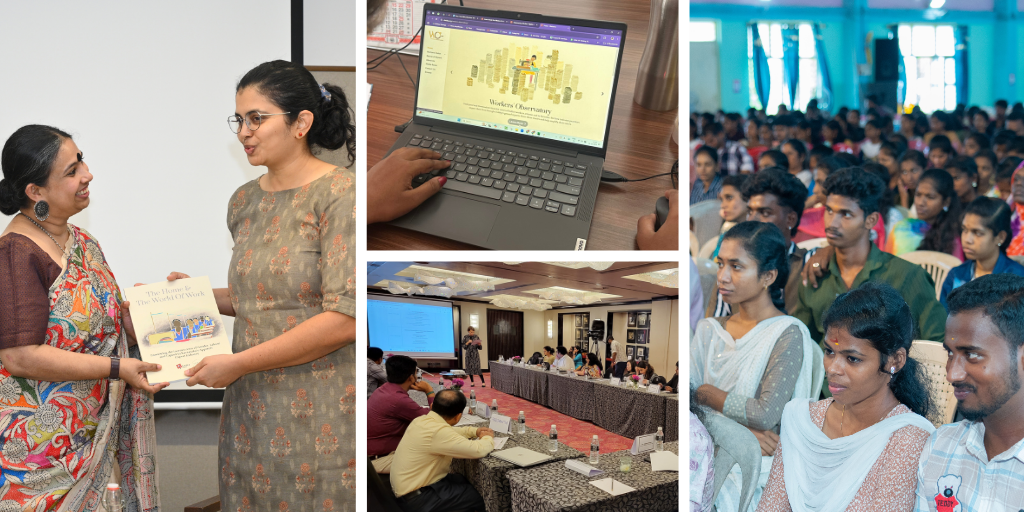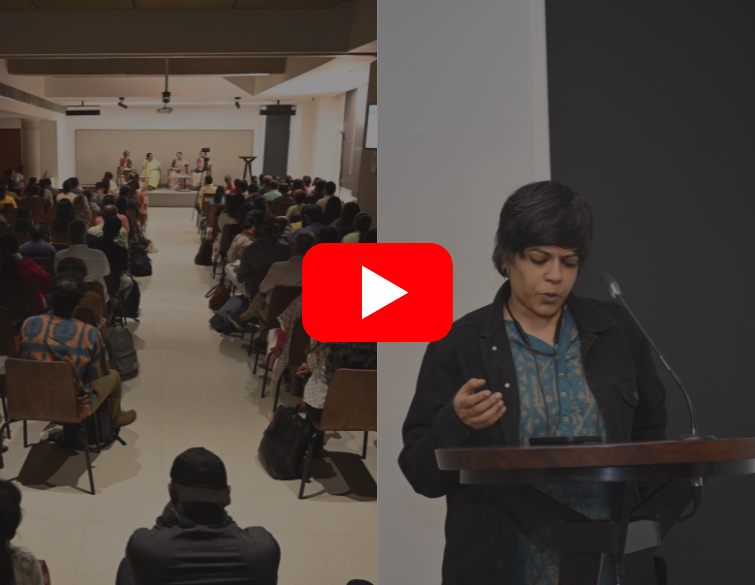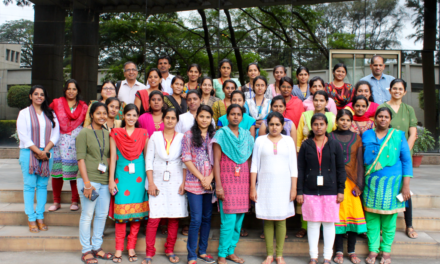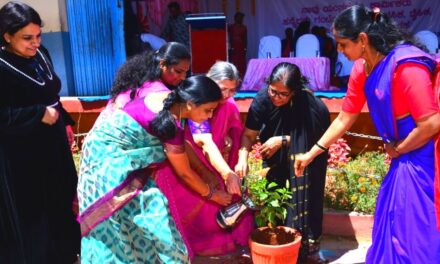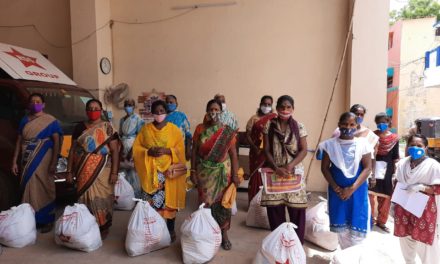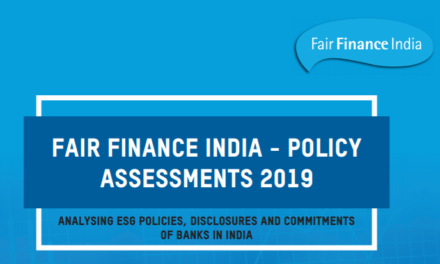The Organisation Amplifies Worker Voices, Uncovers Workplace Violations, and Shapes Accessible Advocacy Tools In Readiness for the Year Ahead
There were times when garment worker Rangamma resorted to pills to get some sleep at night. Her grueling 18-hour day begins before dawn with household chores and ends close to midnight, marked by relentless work, harassment, and the constant fear of losing her job at a Bengaluru garment export factory. Between stitching shirt collars for high-end global brands, facing verbal abuse, and enduring sexual harassment, she has little time to eat, rest, or seek medical care for stress-induced health issues. “The only means of relief is through prayers,” she told a Cividep team, which was documenting worker stories for a new digital platform – Workers’ Observatory.
Enhancing Voices: The Role of Cividep India
Women like Rangamma — facing long hours, inadequate wages, and poor working conditions — often remain unseen and unheard despite their crucial role in producing goods for global markets. This is where Cividep India steps in, working to empower workers through education, solidarity, and advocacy. Cividep addresses human rights risks embedded in global supply chains, especially in export-oriented sectors such as garments, electronics, leather, and plantations. “We stand for improved working conditions: better employment terms, wages, and workplace dialogue,” says Deepika Rao, Executive Director of Cividep India. “We are constantly mapping our environment to see how we can influence it — whether through dialogue with brands, international agencies, investors, or directly with factories.”
Capturing and Shaping Workplace Realities
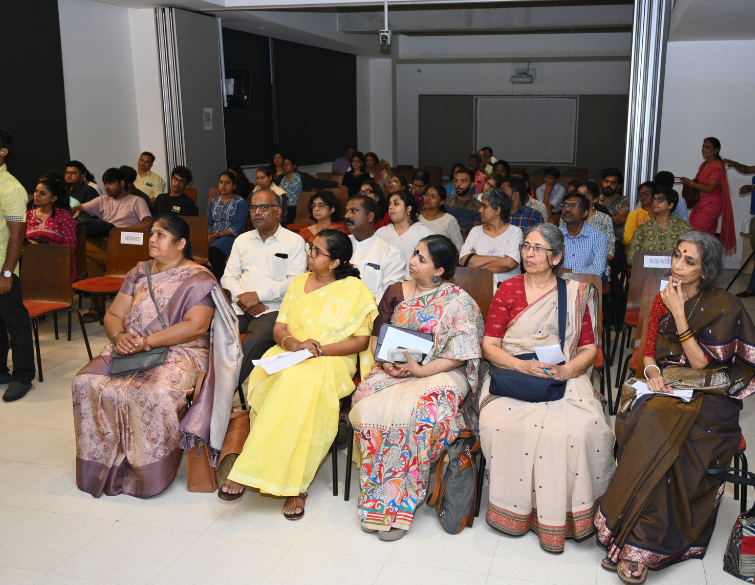 In 2024, Cividep underscored its commitment to advocating for workers’ rights with the publication of The Home & The World of Work, a report examining the intersection of gender, labour, and capital within Karnataka’s apparel export industry. Conducted as part of Cividep’s work within the STITCH project, the report revealed immense pressures faced by women workers: low wages, high production targets, dual responsibilities at work and home, and gruelling shifts that harm their health. (left: The audience at Cividep’s launch event)
In 2024, Cividep underscored its commitment to advocating for workers’ rights with the publication of The Home & The World of Work, a report examining the intersection of gender, labour, and capital within Karnataka’s apparel export industry. Conducted as part of Cividep’s work within the STITCH project, the report revealed immense pressures faced by women workers: low wages, high production targets, dual responsibilities at work and home, and gruelling shifts that harm their health. (left: The audience at Cividep’s launch event)
“We know the readymade garment industry is a rapidly growing sector,” notes Rekha Chakravarti, Director (Research & Advocacy), in an interview with The Migration Story. “Asia dominates garment production, and in India, about 12 million people work in the industry, including 5 lakh in Karnataka. Many women migrate from rural areas, seeking better job prospects and higher wages than what’s available in their home regions.”
This research was brought to life through Garment Kelsa: Woman & Work, a documentary based on the report’s findings. Premiered at the Bangalore International Centre in October, the film highlights the struggles of women garment workers in Karnataka. “They give us a target of 150 pieces hourly. We can manage it for an hour or two, but not for the entire 9-hour workday. If we can’t do it, they shout at us to leave,” says a garment worker featured in the documentary. (right: Garment Kelsa: Women & Work film premiere)
Reaching Out To Workers, Stakeholders
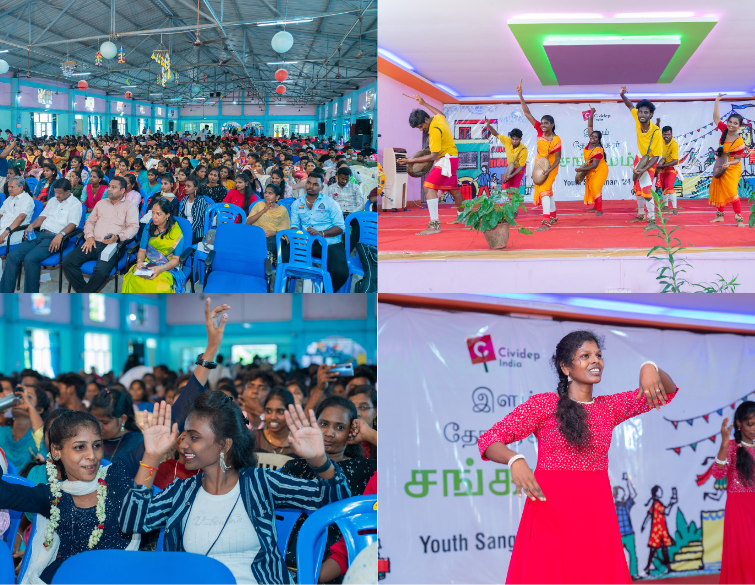 Beyond garments, Cividep’s efforts span the electronics industry, where lakhs of young workers manufacture high-end mobile phone and other consumer goods. Many live in hostels or shared accommodations, earning steady but low incomes in precarious, temporary roles, often socially isolated. In August 2024, Cividep organised a fun-filled Indian Independence Day, Ilam Thozhargal Sangamam (Youth Sangamam), for electronics workers in Kanchipuram’s Special Economic Zones (SEZs). This event provided young workers with a rare opportunity to step away from their demanding routines, showcase talents, and connect with peers, fostering much-needed camaraderie. Many attendees described it as a “great stress-buster.” (left: Independence Day event at Kanchipuram, Ilam Thozhargal Sangamam)
Beyond garments, Cividep’s efforts span the electronics industry, where lakhs of young workers manufacture high-end mobile phone and other consumer goods. Many live in hostels or shared accommodations, earning steady but low incomes in precarious, temporary roles, often socially isolated. In August 2024, Cividep organised a fun-filled Indian Independence Day, Ilam Thozhargal Sangamam (Youth Sangamam), for electronics workers in Kanchipuram’s Special Economic Zones (SEZs). This event provided young workers with a rare opportunity to step away from their demanding routines, showcase talents, and connect with peers, fostering much-needed camaraderie. Many attendees described it as a “great stress-buster.” (left: Independence Day event at Kanchipuram, Ilam Thozhargal Sangamam)
Cividep, along with the German Agency for International Cooperation (GIZ), also hosted a multi-stakeholder roundtable in Chennai to address worker rights in Tamil Nadu’s electronics sector. This gathering of industry leaders, civil society activists, UN agencies, and government officials focused on responsible business practices, mandatory human rights due diligence, and the unique challenges faced by women workers. “In all our work, the focus has been to understand and closely engage with workers, irrespective of sector,” says Sona Pradeep, Director (Programmes). “Now, we are attempting to use digital platforms to connect better with workers,” she says.
Launching the Workers’ Observatory
A significant milestone for Cividep in 2024 was the launch of the Workers’ Observatory, a digital platform combining rigorous research with accessible formats like data visualisations, reports, and worker stories. It highlights both expert insights and the everyday struggles of workers, particularly in the garment sector. Take the story of Lakshmi, for instance. Her life, shaped by caste, poverty, and inequality, reflects a broader narrative of marginalisation. Married at 17 with limited education, she earns less than ₹11,000 a month as a garment worker, enduring harassment and juggling factory and home responsibilities. With no savings or career growth, she faces an uncertain future as retirement looms. “Like many, she plans to return to her village, trapped in a cycle of discrimination and struggle — an all-too-common story for several garment workers,” notes the Observatory.
Tools for Advocacy
In 2024, Cividep launched the Handbook on Business and Human Rights in collaboration with the UNDP’s B+HR program. Designed for worker collectives and grassroots organisations, the handbook simplifies complex BHR standards, demystifies technical jargon, and provides actionable insights. It introduces key frameworks such as the UN Guiding Principles on Business and Human Rights (UNGPs) and India’s NGRBC, offering real-world examples of successful BHR implementation. Recently, Cividep also published a briefing paper on ‘Non-Financial Disclosures, Working Conditions, and Corporate Accountability in Indian Supply Chains’. It focusses on disclosures from eight garment companies and findings reveal gaps between living wage standards and reported median wages, gender pay disparities, high levels of contractual employment, and a lack of clear reporting on freedom of association.
Cividep concluded its transformative three-year Amplifying Workers’ Voice programme in 2024, supported by the Azim Premji Foundation. This initiative trained over 600 garment workers in labour rights, workplace laws, and leadership skills. Thirty-six worker leaders emerged from the programme, equipped to advocate for fairer working conditions.
At the same time, Cividep’s India Labourline (ILL) team in Chennai uncovered a troubling trend: factories increasingly replacing local workers with inter-state migrants to avoid providing social security and other legal benefits. In one incident, ILL team responded by providing legal advocacy and mediation, securing justice for workers, including recovering ₹5 lakh in unpaid wages for 14 security guards.
Looking Ahead: 2025 and Beyond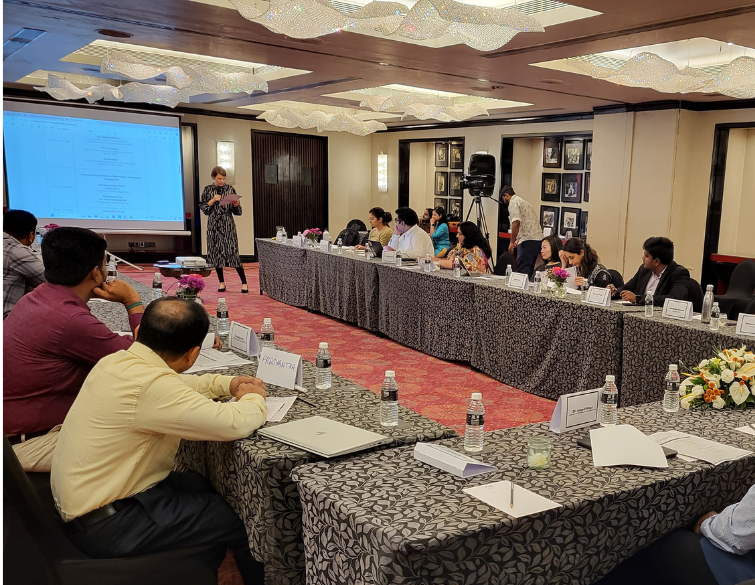
As Cividep heads into the New Year and its 25th anniversary in 2025, its multi-pronged focus on worker rights remains unwavering. The Workers’ Observatory will continue to amplify workers’ voices, while an upcoming research report on Human Rights Due Diligence aims to deepen understanding of factory conditions across Karnataka, Delhi, and Tamil Nadu. Initiatives like Garment Kelsa film will expand their reach, creating spaces for broader dialogues on women and labour. (left: Multi-stakeholder roundtable at Chennai)
Reflecting on the road ahead, Deepika Rao says, “By nature, we are an organisation that is constantly reflecting. Is our work meaningful? If not, why?” Hope the New Year comes with rich answers and more meaningful dialogues.
Cividep India works to empower low-wage workers by promoting labour rights, ensuring workplace safety, and amplifying their voices through advocacy and research. Support our efforts to create fair and just workplaces—donate today at www.cividep.org/donate

